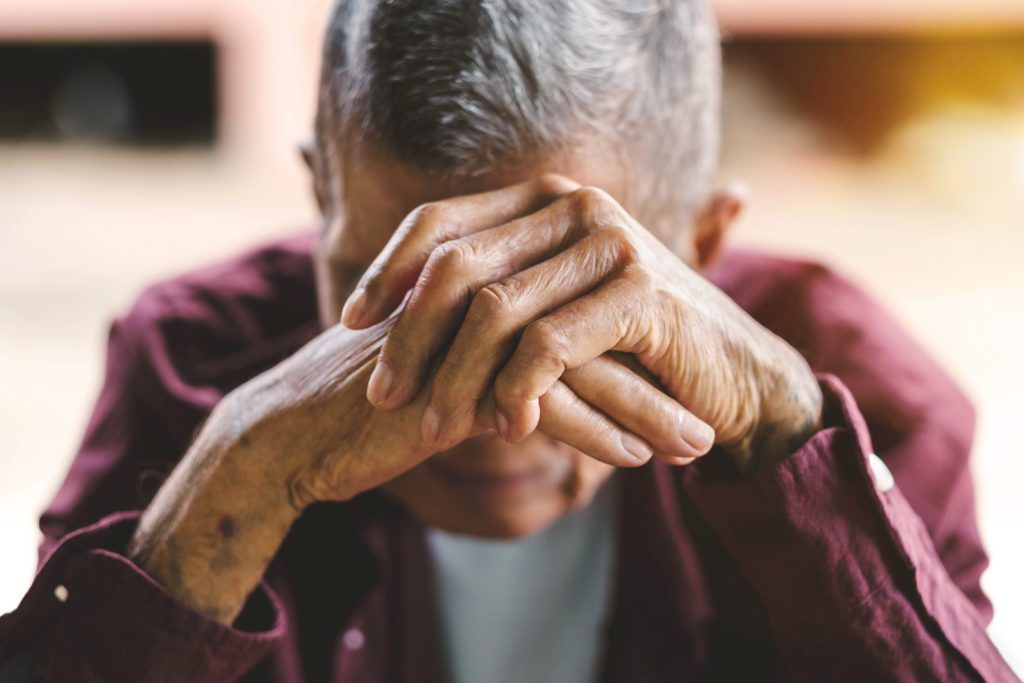Contrary to what some might believe, depression is not a normal part of the aging process. Depression can impact anyone at any age depending on genetics, brain chemistry, and environmental factors. Aging brings unique challenges, and some of those challenges may trigger loneliness and depression in some people. Read on to learn signs and symptoms of depression to look out for and what can be done to help the older adult in your life who may be facing depression.
Each stage we travel through in life includes many significant changes, and the golden years are no exception. Older adults can experience significant experiences that may trigger depression in some. Retirement can be a very difficult transition, especially for those who relied on their career to define their purpose. Health changes may trigger depression in others, as their bodies develop a physical limitation or disability and they are no longer able to do activities they love. Retirement and being less active can both result in isolation, which can be yet another trigger for depression.
Everyone experiences days of sadness here and there, but if your loved one starts displaying more serious warning signals of depression – take note. Symptoms of depression include a loss of interest in hobbies or activities, changes in sleep (sleeping too much or too little), changes in appetite, withdrawing socially, physical aches and pains, being overly irritable, general apathy, and memory loss that’s not related to dementia.
If symptoms of depression are coming to the surface in your loved one, the good news is that there is help available. Seek the advice of a medical professional who can provide medication, therapy, or a referral to a mental health specialist. Encourage your loved one in seeking help and support them along the way.
Thankfully, there are many proactive ways to help older adults avoid depression. Research has found that loneliness and isolation can have a detrimental effect on our health and well-being. If a senior lives alone and finds it difficult to drive or leave the house, there is an increased risk of loneliness and isolation’s negative effects. Older adults who are lacking social connections often suffer higher rates of injuries, infection, cognitive decline, and/or depression. Maintaining connections is crucial for our well-being. If done safely, older adults can benefit from regular one-on-one visits from caregivers and/or family members. Remember, connection is not only about spending time with one another, but taking the time to listen and understand each other. Being part of a community can also help someone avoid the dangers of isolation and loneliness. Being active in a club, community group, or church can help provide a sense of community. Older adults who live in a retirement community, assisted living facility, or skilled nursing center have the benefit of being surrounded by others and having regular opportunities for connection. At Snyder Village, which is a life plan community offering retirement living, assisted living, and skilled nursing, residents regularly connect with one another by eating meals together, engaging in activities together, and being involved in interest groups such as Bible studies or exercise classes.
Another way to be proactive against depression and isolation is to take advantage of technology and all it offers. The pandemic has taught us the important role that technology can play in connecting others. Video calls, digital photo sharing, and social media can all serve a purpose in relieving isolation. If a senior is not familiar with technology or intimidated by using the latest gadgets, a simple phone call or email can do wonders to boost someone’s mood and help them feel less isolated.
Regular exercise is another proven way to avoid depression. Regular outdoor walks in nature have been shown to lift the spirits and boost mood. If a senior has physical limitations, chair exercises can be beneficial. Group exercise, like the chair exercise classes that happen regularly at Snyder Village, has the double advantage of providing the health benefits of physical activity and the mental benefit of social connection.
One of the best ways to avoid depression and loneliness is to find a sense of purpose. You can help your loved one feel that they’re contributing and making a difference in someone’s life or in the local community. Get creative in finding an outlet for their passions, abilities, and skills. Volunteering at a local food bank or animal shelter, helping the grandkids with schoolwork, or sharing musical talent with others are just a few ways to make a difference. Residents at Snyder Village enjoy volunteering around the campus and offering their services to help other residents and staff. Many volunteer by distributing the community newsletter, delivering meals to others, helping with activities, or gardening to provide vegetables or flowers that others on the campus can enjoy. If you look, there are many ways and opportunities to get involved and find a sense of purpose.
Growing older brings its unique challenges, but it doesn’t have to mean depression and loneliness. Older adults can avoid isolation and its dangers by making an effort to connect with others, taking advantage of technology, getting regular exercise, and finding a sense of purpose. Dealing with depression and avoiding the dangers of isolation can give the older adult in your life the freedom to enjoy all the benefits that the golden years can provide.





